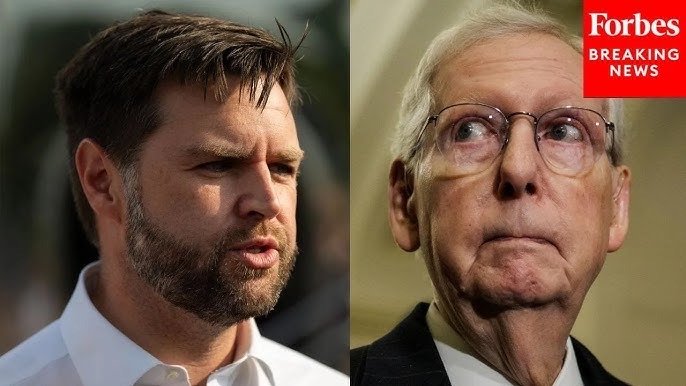The longtime Kentucky senator and former GOP leader has stepped out of the shadows with a scathing critique of Vice President JD Vance, accusing him and other Trump administration insiders of promoting a dangerously naive isolationism. In a high-profile June 27 interview with Politico, followed by a pointed Senate floor speech, McConnell warned that America’s global leadership—and the Republican Party’s credibility—hang in the balance.
At the center of his ire: the “America First” foreign policy approach that has defined Donald Trump’s second term, and the rising influence of figures like Vance, Secretary of Defense Pete Hegseth, and Director of National Intelligence Tulsi Gabbard.
“They’ve learned nothing from history,” McConnell charged, likening today’s anti-interventionist sentiment to pre-WWII U.S. isolationism.
The Old Guard Returns
After relinquishing his leadership role last year, many assumed McConnell would fade into a quieter, back-bench role. Instead, the 83-year-old senator has reemerged as a vocal defender of traditional GOP foreign policy—calling for increased defense spending, NATO leadership, and a renewed commitment to global deterrence.
While McConnell praised Trump’s pressure on NATO allies to boost their defense budgets, he argued that America must lead by example. “Populist rhetoric and social media posts are no substitute for hard power,” he declared from the Senate floor.
A Battle of Visions
JD Vance, a key player in Trump’s foreign policy team, has long championed a more restrained U.S. approach overseas. While he’s sought to balance that view with support for recent strikes on Iranian nuclear sites, critics like McConnell see his caution as weakness.
The clash between the two men lays bare a growing schism in the GOP: one side clings to Cold War-style deterrence and global presence, while the other leans toward nationalist retrenchment, wary of endless wars and foreign entanglements.
McConnell didn’t stop at Vance. He voiced concern over others shaping defense policy—including Hegseth, Gabbard, and DoD official Elbridge Colby—saying he opposed their confirmations and feared their collective influence could undermine U.S. strategic priorities.
Not Just a Party Feud
The senator’s comments also reflect deeper unease among establishment Republicans, who fear the party has drifted too far from its roots. With Trump’s orbit favoring ideological outsiders and skeptics of globalism, McConnell’s reentry is both a challenge and a warning.
“There’s only one decider,” McConnell noted about Trump, “but someone has to offer a counterpoint. That’s what I’m doing.”
An Unfinished Fight
As the Republican Party stands at a crossroads, the McConnell-Vance feud highlights a broader existential question: What should America’s role in the world be? With global tensions rising—especially after the strikes on Iran—McConnell’s reassertion of interventionist values adds weight to the conversation.
Whether the GOP returns to McConnell’s vision or continues down Trump’s nationalist path remains to be seen. But one thing is clear: the debate over American leadership isn’t just alive—it’s escalating.

 English
English



























































